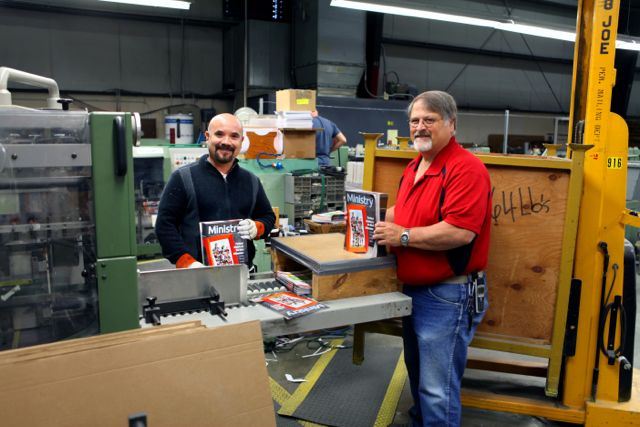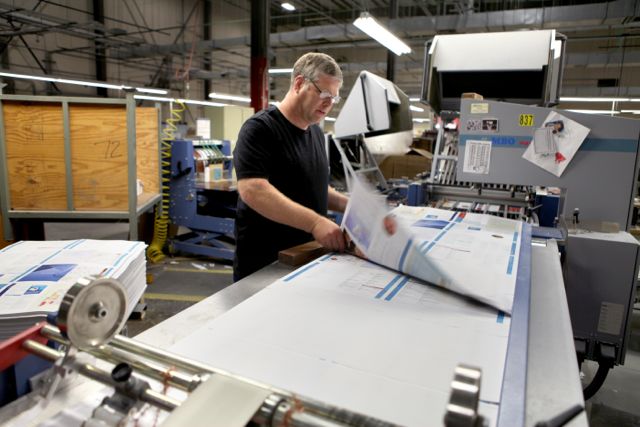Faith in Their Work
Formally established in 1863, the Seventh-day Adventist Church has, over the past century and a half, grown from a devoted offshoot of 19th-century revivalism into a global presence.
Even as early as the 1840s, the small group of faithful that would become the church relied on the printed word to interconnect the community. It began with
Standing outside Pacific Press’s Nampa, ID, plant are (from left) Joan Gutierrez, Harold Curtis, Larry Johnson, Gary Guernsey and Robert Congleton.
pamphlets and periodicals like church founder James White’s The Advent Review and Sabbath Herald, which was joined a few years later by more formal publications like The Present Truth, which is published to this day under the name The Adventist Review.
Overseeing the production of The Adventist Review, as well as countless other jobs, is Larry Johnson, vice president of production at Pacific Press in Nampa, ID. Pacific Press is the publishing arm of the church, where Johnson has sat at the helm of the in-plant printing operation since March of 2014.
To say he’s been with Pacific Press for a little over a year, though, doesn’t quite get it right. The fact is, Johnson came out of retirement to take the gig, and his relationship with the facility goes back to 1984, and includes 10 years of direct employment punctuated by overseas missionary work.
There’s a reason for the close relationship: Johnson, the in-plant and Pacific Press all belong to the church and share its mission. Like the in-plants at so many churches and religious organizations in the U.S., Pacific Press employees are almost to a person members of the church as well. This connection gives them a strong pride in their work and a desire to produce the best quality possible. Their devotion, both to their work and their faith, leads to a very positive plant atmosphere
Large, Lean and Efficient

On the production floor, José Francisco Sánchez and Rick Lee hold up copies of Ministry magazine, an international journal for ministers.
With 55 employees staffing a shop with a $12.5 million budget, Pacific Press is well above average size for an in-plant, even as its overall print volumes have declined over the past few years. Part of its success can be attributed to the work it took on after another Seventh-day Adventist printing operation—The Herald Publishing Co.—closed its doors last year. The shop has also added a quick-print service called Copy Express, and it carefully controls its inventory of hardcover books and other products with long shelf lives.
“We’ve tried to keep this operation as lean and efficient as we possibly can,” says Johnson.
But there’s more to the in-plant’s resilience than strict bottom-line discipline. In fact, some of the characteristics unique to Pacific Press might make an accountant from outside the church scratch his head.
For instance, this otherwise round-the-clock operation goes dark on Friday and Saturday. That’s because Seventh-day Adventists consider Saturday to be the Sabbath (as opposed to Sunday, the day most other Christian denominations set aside for rest and reflection). The in-plant could hum with lucrative productivity during that time, but it doesn’t. The mission of the church comes first.
Gary Guernsey, Eric Peterson and Cliff Braswell prepare to position plates on the manroland Rotoman web press.
Trained from Scratch
Another decision that might seem counterintuitive is the fact that almost every new hire has to be trained completely from scratch.
“We bring people from all over the U.S. to work here, plus from Canada, and other countries,” says Johnson. “But only one other person here [besides Johnson himself] has any other printing experience.” The operation would no doubt see much faster ROI on its payroll spend if every new hire was a seasoned industry veteran. But here, too, the mission of the church comes first.
These decisions would be strategic blunders at a shop managing quarterly earnings expectations. But Pacific Press is set within a much larger context, and the usefulness of these choices becomes very clear.
“This organization has existed since 1875,” explains Johnson, “and it’s part of a whole.”
Repeatedly hiring out-of-towners with zero printing experience might seem a recipe for disaster at a commercial print shop. But if they’re still with you decades later, you’ve got a shop stacked front to back with expertise no amount of money could buy, and that’s the case at Pacific Press.

Leonard Pflugrad at the MBO Navigator folder, which is busy folding a 16-page signature in preparation for binding.
“We’ve got a lot of folks who have been here for more than 30 years,” says Johnson. “And when you have people who have been around for a while, they know the work and they can get it done time after time.”
And while unplugging an operation at a time when it should be busiest might not seem logical in another context, at Pacific Press it makes perfect sense: If the shop is busy in the first place, it’s thanks to the work it does for the church, and the church doesn’t work on Fridays and Saturdays. The in-plant is part of a whole.
Mutually Beneficial
Because Pacific Press is essentially a unique manifestation of the church’s mission, the relationship between in-plant and parent organization is mutually beneficial in a way that can’t be replicated at, for example, a government agency or an insurance company. That plays out in very specific ways.
“Why does the church keep the work in-house? We’re the only facility that can produce these very specific jobs at this price and turnaround time,” says Johnson. Among the projects moving across the Pacific Press production floor are three full-color magazines, black-and-white books, and half-tone jobs that require a specialized heatset web press.
“It’s difficult to find that stuff anywhere, let alone at a good price,” he notes. “So we’ve been able to develop an in-house operation that covers those jobs and that keeps the price competitive with the industry.”
The precisely aligned missions of in-plant and the church allow for workflow efficiency with its “client” that might be impossible elsewhere. “The editorial process works with our process and with the marketing process, which is important because when a job is finally production-ready we know what to expect and can deliver when the turnaround times are really tight. We’re just one part of a much larger team.”
Like any good team, the relationships between the in-plant, Pacific Press and the Seventh-day Adventist Church are bi-directional.
“The in-plant contributes to the mission of the church first and foremost because all the employees here are members of the church,” says Johnson. “That’s the way it’s always been."
Related story: Seventh-day Adventist In-plant to Expand












